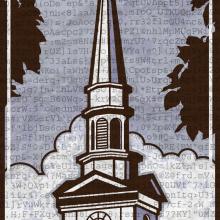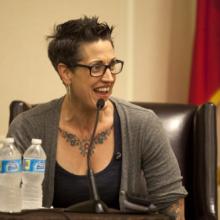Nadia Bolz-Weber
This Lent, I urge you to:
- Create a book club.
- Gather with a few friends over coffee and talk through ideas of decolonization.
- Challenge yourself at home and in the workplace to fight toxic stereotypes.
- Re-educate yourself about the history of the United States and the church’s role in empire.
- Grieve, and don’t be afraid of what the wilderness might show you.
Books are always a great place to begin the journey.
“IT'S HARD TO imagine the average evangelical church embracing Mutesa’s colorful portraits of nude black joy,” writes Faith-Marie Zamblé in her profile of the young photographer whose work is rippled with laughter, face paint, and bare skin. Though the mood of Mimi Mutesa’s work is more exuberant than explicit, Zamblé is right: Blame it on the apple, Augustine, or purity culture, but many churches we know—evangelical or otherwise—blush when it comes to body parts, especially naked ones. Ever notice how crucifixes often have Jesus wearing a loincloth despite scripture’s insistence he was stripped?
We suspect Christian jitters around nudity are rooted in fear that naked bodies will arouse unholy sexual thoughts. But as Lutheran pastor Nadia Bolz-Weber points out, the church’s tendency to couple sexuality and sin has led to a sense of shame that many Christians find hard to shake. “I wonder how we could begin to honor sexual pleasure as something that can connect us more deeply to ourselves and others and God, yet still speak the truth about the ways in which our behaviors around sex can also do the opposite,” she writes in “Honor Thy Sexual Pleasure?” an excerpt from her forthcoming book, Shameless: A Sexual Reformation.

Jmaggiophoto / Shutterstock.com
"In the wake of this election, the role of faith communities is imperative," writes Jim Wallis in "Resistance and Healing." With this in mind, we asked a few Christian leaders how followers of Jesus can best practice resistance and healing in Trump's America. Though varied, the responses we received have a common theme: Christians must stand in solidarity with the vulnerable. Now and always. —The Editors
Resistance is Holy Work
by Brittany Packnett
RESISTANCE IS HOLY WORK. Resistance is what it means to tell the truth and defend people in public, even—and especially—when it is inconvenient, dangerous, and uncomfortable.
What truths must we tell? We must tell the truth that the entire world is not white, straight, Christian, cis-gendered, American-born, male, or able-bodied, and that those of us who aren’t matter just as much as those of us who are. We must tell the truth that rhetoric and policies that encourage violence against those same people is not of God and not of the freedom we espouse. We must tell the truth that if all of us were truly created equal, then the cancer of xenophobia makes all of us sick—and that none of us are truly free until we are all free.
We did not lose an election as much as we validated and normalized a way of life that is beneath our humanity—and, therefore, which requires our resistance. The Christ I serve did not sit idly by in times like these—for in eras like this one, inaction is a sin. Inaction perpetuates this latest wave of hate just as much as if you painted a swastika yourself. Hate should never be welcome in our homes, at our tables, in our worship, or in our country.
It is holy to resist such things. Holy resistance means calling out that hate by name and casting it out of where you are—of where you want God to be. Casting it out means no longer making excuses that your grandfather just talks like that because he is elderly; it means withholding your tithes and membership from those places that will not be safe havens and sanctuaries for those persecuted under potential new rules of law; it means challenging the notion that we stitch together a false unity rather than acknowledge the explicit danger many of us are now placed in.
Holy resistance means praying for those who persecute—but protecting the persecuted. Christians must be people of moral conscience, those who conscientiously object to hatred, division, racism, and sexism as unashamedly as we claim Christ. The call to be in the world and not of it was for such a time as this—we must be the light that shines on injustice and calls out our humanity to replace the evil we see.
Resistance is holy work. That makes it our work.

Image via marekuliasz/Shutterstock.com
What’s your number?
It’s not a pickup line. At least, it wasn’t at the pre-conference portion of an event called “Why Christian?,” which was back for its second year at Fourth Presbyterian Church in Chicago.
No, this inquiry is actually just a standard part of the Enneagram, an ancient personality typing system that recently has exploded in popularity in Christian circles.
This week's Wrap was guest curated by Sojourners contributor Adam Ericksen. Read along for his top stories and notes from the week!
There was a lot of negativity in the news this week, but mercy also filled the airwaves. In case you missed it, here’s a list of some merciful events from the week:
1. Pope Francis Opens the Door to ‘Year of Mercy’ in a Time of Fear
Sure, we have some differences, but we’re still crushing on the Pope. “To pass through the holy door means to rediscover the infinite mercy of the Father who welcomes everyone and goes out personally to encounter each of them.”

Image via Nadia Bolz-Weber / RNS
Nadia Bolz-Weber is the kind of pastor who ends up doing funerals for an alcoholic stand-up comic and a transvestite. The founder of Denver’s House for All Sinners and Saints, this tattooed, profanity-loving Lutheran pastor wants nothing more than to tell it like it is.
Her newest book, Accidental Saints: Finding God in All the Wrong People, expands on her trademark exploration of finding God in the unexpected.
“When it comes down to it,” said Bolz-Weber, “the church is for losers. We connect to each other and to God through our shared brokenness, not through our personal victories and strengths and accomplishments. This is why it’s hilarious to me when people sort of write me off as hipster Christianity. You have definitely not been to my congregation. It is not hip.”
Within her tale of adding reconciliation to her annual lessons and carols was a challenge to the church: to come out of the hole of escapism and into “a place where we dive right into difficult truths.”
With hard-hitting candor, Pastor Nadia asked, “When we find ourselves in a world where we see up-to-the-minute images of human suffering...can we really afford quite so much sentimentality in Christianity?”
As we see bodies of child refugees washed upon shorelines, can we sit comfortably in our pews, not asking for any changes to our hospitality or political structures? When we know that innocent lives continue to be lost at the expense of keeping control of our guns for our own personal safety, does it make sense for us to gloss over the stories in the Gospel where Jesus proclaims peace over all things? Is Christianity about memorizing the most inspirational verses of the Bible, or is it about putting them into action to combat the injustices of our reality?
Nadia Bolz-Weber's church, House for All Sinners and Saints, is not your typical Lutheran church.
Nadia Bolz-Weber, pastor of the House of All Sinners and Saints in Denver, Colo., talks to CNN.
Earlier this morning, I saw a tweet from @JesusofNazareth316: Blessed are they who stop using the word “#missional," which caused me to post something on Twitter and Facebook asking people what their favorite church jargon is — mine being “Missional Imagination.” The response was unbelievable and also quite interesting.
I realized upon reading the #meaninglesschurchjargon tweets that the responses tended to fall into several categories:
1. Mainline Protestant church consultant/bad seminary class lingo. (“Missional imagination”; congregations as “centers for evangelical mission”; pastors as “transformational leaders”; referring to members as “giving units”; and churches “doing life together”) this language has a commonality with corporate jargon and like corporate jargon, refers to the culture and practices related to an organization.
IDEA: Let’s make sure that in seminary classrooms and at church conferences and in congregational life when we use a term or a phrase, that it points to an actual thing or person or event and is not just a string of words that sound like something meaningful but, in fact, lack real meaning. There is a reason that my computer does not recognize the word Missional. Try it at home. Go ahead. Type that shit and see.
PASADENA, Calif. — The first thing most people mention when they talk about Rev. Nadia Bolz-Weber is her tattoos. She has many — most of them religious in nature, including a large icon of Mary Magdalene covering her right forearm.
Then they talk about how tall she is (6 foot 1), that she looks more like the lead singer of an all-girl punk rock band than a pastor and that she (unapologetically) swears a lot — even from the pulpit while preaching.
All of the above is true and part of what makes Bolz-Weber unique among high-profile pastors and so-called “Christian authors.” (I hate that term. The word “Christian” is best used as a noun, not an adjective.)
Some people follow pop-star celebrities. I follow spiritual writers.
Rather than tracking news about Lady Gaga or Beyonce, I’m a fangirl of writers like Anne Lamott, Nora Gallagher, Kathleen Norris, and Barbara Brown Taylor.
The obsession is borderline embarrassing. Just last month, I announced at a party that writer Nora Gallagher, author of Moonlight Sonata at the Mayo Clinic, friended me on Facebook. (In truth, I was bragging about an imaginary friend.)
After Nora accepted my friend request, I was bold enough to send her the link to an op-ed I had written about making my teenager go to church. Within 48 hours, Nora wrote back that she liked the title of my piece. So I was convinced she would like me too.
My love of spiritual memoirs has reached the point that my book club, The Literary Ladies, issues a collective groan when it’s my turn to suggest book titles. Many believe that memoirs about faith are slightly self-indulgent. In contrast, I view such writing as the deepest expression of sacred meaning in the chaos of our daily lives.
One odd way that we all keep up with the Kardashians is in the extraordinary effort we put into maintaining our own personal “brand”. The reaction of Khloe to recent allegations of drug addiction against her husband, NBA player Lamar Odom, is a Kardashian case in point. In reporting on this newsworthy event (sarcastic sigh), Huff Post speculated as to why Khloe was continuing with business as usual, posting “booty shots” and making no reference to her husband’s problems. They asked, “Is the 29-year-old trying to avoid the harsh reality that her husband is struggling with drug abuse, or is she simply trying to keep up the family’s brand?”
Posturing like a Kardashian
We can all appreciate that Khloe might need some privacy from prying and judgmental eyes because you don’t have to be a Kardashian to want privacy when things go wrong. Who wants to be judged for our mistakes by gleeful critics and gloating rivals? When we err, we tend to hide our errors from others and all too often, from ourselves. We are as desperate to maintain our “brand” – our self-identities as flawless, perfectly good, failure-free paragons of virtue – as if we were the public face of a multi-million empire.
I have this friend Caitlin who tends to just tell me the truth about things, which isn’t always comfortable.
Caitlin and I close friends but are really different people, and years ago we were both planning our 40thbirthday parties. Mine was a roller disco party at a rink I rented out – and hers was a group of close friends watching the sunrise on a hill over looking the city, which made me comment that Caitlin has so many personality traits that are just truly lovely and that I don’t have those same traits and she said “Of course you do Nadia, they just aren’t your favorite ones.”
I thought about that this week when I was reading our Gospel text and how Jesus seems to be addressing the things we do or don’t do so that we can be thought of in a certain way. As though he can just see right through us. Which is just the worst.

Jesus healing the lepers, © Daniel W. Erlander, http://danerlander.com
I have to say, one of my very favorite things about Jesus is how he does whatever he wants to and could really give a hell about how other people feel about it. Yeah. I just find that endearing — especially when he irritates the nice religious people. That’s secretly my favorite.
In our Gospel text for today Jesus is teaching in the synagogue on a Sabbath when he sees a woman with a crippled back. He saw her, called her over and said “Woman you are set free from your ailment.” He reached out and touched her and she stood upright for the first time in 18 years and praised God — which seems like a win. Except for that then the leader of the synagogue throws a little tizzy about how that kind of thing should not be happening on the Sabbath. Further proof that super religious people can just be so helpful, can’t they?
Especially when they seem to value parameters over people – which should sound like a familiar story …
Stories of churches denying your call to ministry because you fall outside the parameters of which gender is allowed to be ordained and stories of churches denying you the Eucharist because you fall outside the parameters of what kind of sexual orientation is allowed to receive the means of grace and stories of churches denying you a place in community because you just weren’t sure if you believed in God and that falls outside the parameters of doctrinal purity – well, these kind of stories are sadly bordering on cliché around here. We hear them all the time.
I woke up this morning in a damp sleeping bag to the sound of a rushing river. I heard the laughter of children and could smell bacon being fried in a tent not far from mine. I opened the tent flap and walked outside. As I looked around, I saw dozens of men and women who had also just rolled out of their sleeping bags and RVs to welcome the new day. I saw rainbow flags flying next to signs that read “Who would Jesus Torture?” and “Pro-Peace, Pro-Life, Be Consistent.”
As I began the short trek from my tent to the shower-house, I was greeted by dozens of people who I had never personally met but felt like I knew intimately. All of us had gathered to encourage and provoke one another to do justice, love mercy, and walk humbly with our God. Over the course of this weekend, dozens of presenters spoke to crowds who listened intently to their dynamic messages of reformation, renewal, redemption, and action. From the testimony of a tattooed Lutheran pastor to the ground-breaking theological theories on non-violence from a highly regarded gay Catholic priest, from the wisdom of one of the founding fathers of the Civil Rights Movement to a quirky live radio show hosted by one of the founders of the Emergent Church movement, hundreds of people from across the country and indeed around the world had converged for this little slice of heaven on earth known as the Wild Goose Festival.
DURING MY EARLY years of sobriety, I spent most Monday nights in a smoke-filled parish hall with some friends who were also sober alcoholics, drinking bad coffee. Pictures of the Virgin Mary looked down on us, as prayer and despair and cigarette smoke and hope rose to the ceiling. We were a cranky bunch whose lives were in various states of repair. There was Candace, a suburban housewife who was high on heroin for her debutante ball; Stan the depressive poet, self-deprecating and soulful; and Bob the retired lawyer who had been sober since before Jesus was born, but for some reason still looked a little bit homeless.
We talked about God and anger, resentment and forgiveness—all punctuated with profanity. We weren’t a ship of fools so much as a rowboat of idiots. A little rowing team, paddling furiously, sometimes for each other, sometimes for ourselves; and when one of us jumped ship, we’d all have to paddle harder.
In 1992, when I started hanging out with the “rowing team,” as I began to call them, I was working at a downtown club as a standup comic. I was broken and trying to become fixed and only a few months sober. I couldn’t afford therapy, so being paid to be caustic and cynical on stage seemed the next best thing. Plus, I’m funny when I’m miserable.
This isn’t exactly uncommon. If you were to gather all the world’s comics and then remove all the alcoholics, cocaine addicts, and manic depressives you’d have left ... well ... Carrot Top, basically. There’s something about courting the darkness that makes some people see the truth in raw, twisted ways, as though they were shining a black light on life to illuminate the absurdity of it all. Comics tell a truth you can see only from the underside of the psyche.
A few years ago I wrote a book about the experience of watching 24 consecutive hours of bad Christian television. My friends and family signed up for an hour each to watch along with me. The whole thing was insane, but things got especially crazy around 1 a.m. when a show called the Power Team was on. Now, thePower Team are a bunch of enormous steroid-muscled men who hold really loud Christian rallies in which they tear phone books in two and break 2x4s over their heads by the power of the Holy Spirit. And they talk a lot about what “the Lord” had done for them. It’s impressive stuff.
Anyway, so our own Andie Lyons was watching with me along with my friend Jerry. And the three of us watched in stunned silence for a moment trying to understand what it was we were seeing, at which point Andie finally said “so wait, basically they break stuff for the Lord?” and I answered yes, and then Jerry said “big deal, I break stuff all the time,” to which Andie asked, “but is it for the Lord?” and Jerry said, “well, it is now!”
Honestly the only reason I told you this story is by way of saying that I’m not a fan of the over-use of the term “the Lord. ”Like when people say “I just love the Lord,” I just never really know what that means. The way it’s casually thrown around makes me uncomfortable especially after Harry Potter, since Voldemort is called the Dark Lord. I just, I don’t know, I’m not saying it’s wrong, I’m just saying that for whatever reason, I can’t handle it.











